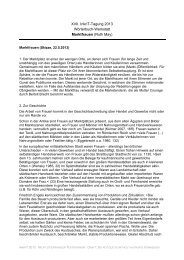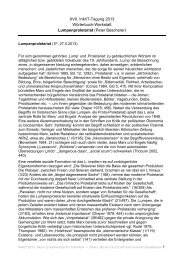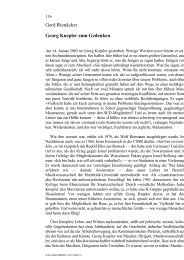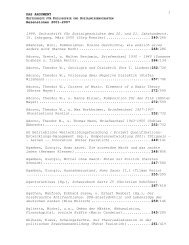Krieg! AIDS! Katastrophen! - Berliner Institut für kritische Theorie eV
Krieg! AIDS! Katastrophen! - Berliner Institut für kritische Theorie eV
Krieg! AIDS! Katastrophen! - Berliner Institut für kritische Theorie eV
Erfolgreiche ePaper selbst erstellen
Machen Sie aus Ihren PDF Publikationen ein blätterbares Flipbook mit unserer einzigartigen Google optimierten e-Paper Software.
Summaries<br />
Andrzej Malkiewicz und Jerzy Palys: Passages and Pitfalls in the Construction of<br />
Capitalism in Poland<br />
U sing Poland as a case study, the authors examine the various stages and consequences of<br />
»shock therapy«, the monetarist formula for the transition to capitalism. They demonstrate that<br />
Poland has been forced to accept a transformation into a Third World economy.<br />
Yuri Krasin: After the Failure of »Shock Therapy« in Russia<br />
The author, director of a Gorbachev Foundation research program in Moscow, gives an account<br />
of the eeonomic policies of the Gajdar government. He shows that »shock therapy« in<br />
Russia was half-hearted, applied without the monetarist condition of »hard« currency. He<br />
argues for the regulation of eeonomic and social policies during the transition to a »mixed«<br />
market economy.<br />
Joachim Hirsch: International Regulation<br />
Given the failure of the two main theories of development, modernization and dependency<br />
theories, the author sketches out an alternative cancept for the analysis of global capitalism that<br />
is based on the »Theory of Regulation«. To do this, the author applies the regulation approach<br />
to a level beyond the limits ofthe nation-state. The development ofworld capitalism is examined<br />
in the wake of the »Fordism«-crisis of the mid '70s, characterized by the decline of US<br />
hegemony and the strong differentiation among the »newly industrializing countries«. A central<br />
thesis is that international relationships of dominance and dependency are not fixed by<br />
means of a structural economic logic, but essentially by social power relations and institutional<br />
political forms particular to the individual countries. The processes of democratization in the<br />
countries of the periphery are, therefore, of central importance; they are also characterized by<br />
special contradictions.<br />
Paul M. Sweezy and Harry Magdoff: On Understanding the History of Capitalism<br />
The authors examine the historical development of capitalism to explain the causes of the current<br />
recession. Their main thesis is that the basic problem of a mature capitalist society is the<br />
absence of a strong and reliable demand for capital.<br />
Ingrid ArbeitIang: How Iiberating was the »Supportive Development« of Women in the<br />
GDR?<br />
Proceeding from an analysis of the legal and socio-economic regulations of the employment<br />
policies of the GDR, the author reveals structural discriminatory mechanisms that harmed<br />
women in the workplace. The on-going market economic transformation in the new east German<br />
states has negative consequences for women, in part because this transformation has been<br />
based on the patriarchal structures that were dominant in the GDR.<br />
Thomas Weber: Unhappy Angels - Heiner Müller and WaIter Benjamin<br />
Comparative readings of three metaphors as signatures of distinct epochs: Walter Benjamin's<br />
»Engel der Geschichte« (1940) for the fascist epoch of capitalism, Heiner Müller's »Der<br />
Glücklose Engek (1958) for GDR-socialism after Stalin's death, and Müller's »Glückloser<br />
Engel 2« (1991) for the post-communist situation after the fall of the Wall.<br />
Jost Hermand: Questions to Heiner Müller's Autobiography<br />
The author identifies three contradictory text strategies in the autobiography of the East German<br />
writer Heiner Müller: an »existential« one, in which Müller attempts to display himself<br />
as an author untouched by historical and political events; second, a struggle for a »better, more<br />
radical socialism«; and finally an "assassinationistic anarchism« in which he seeks 10 confront<br />
the horrors of the world with the methods of horror.<br />
IX<br />
DAS ARGUMENT 19811993 ©

















